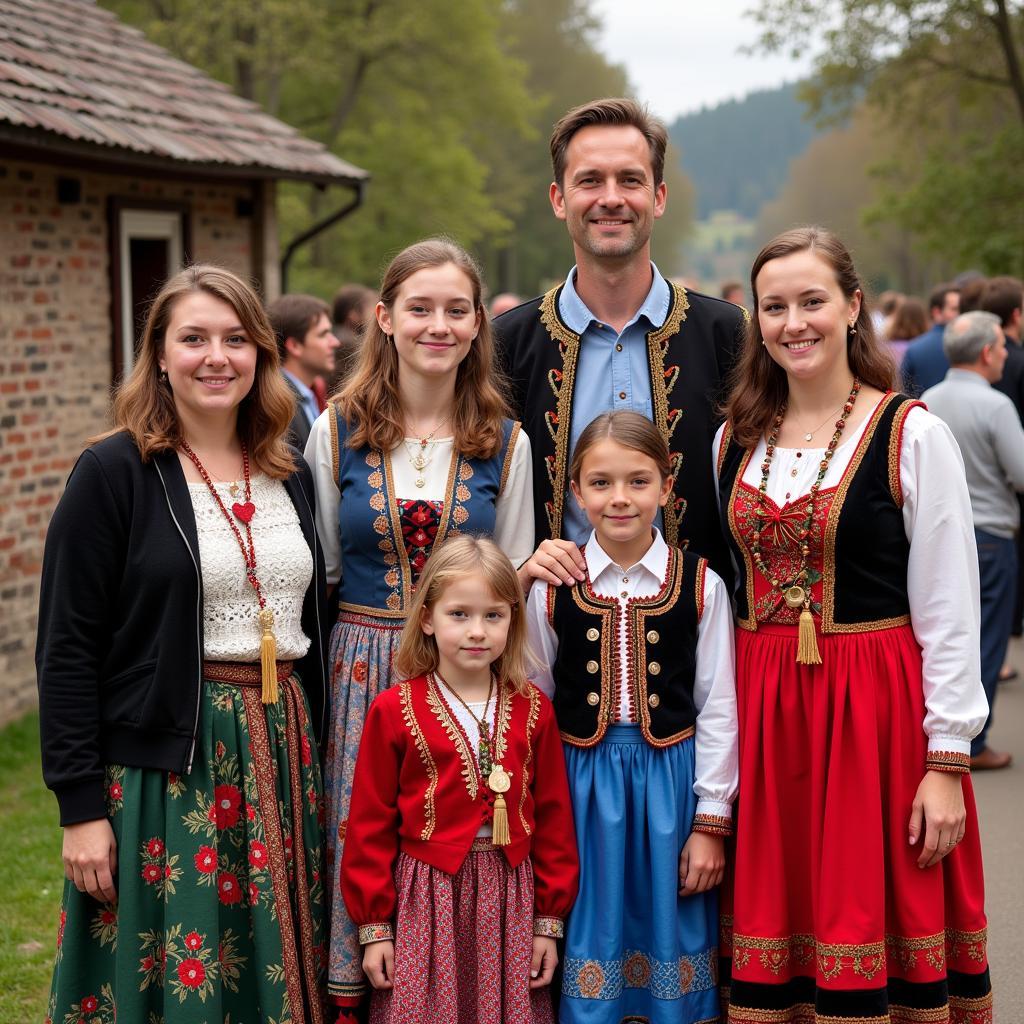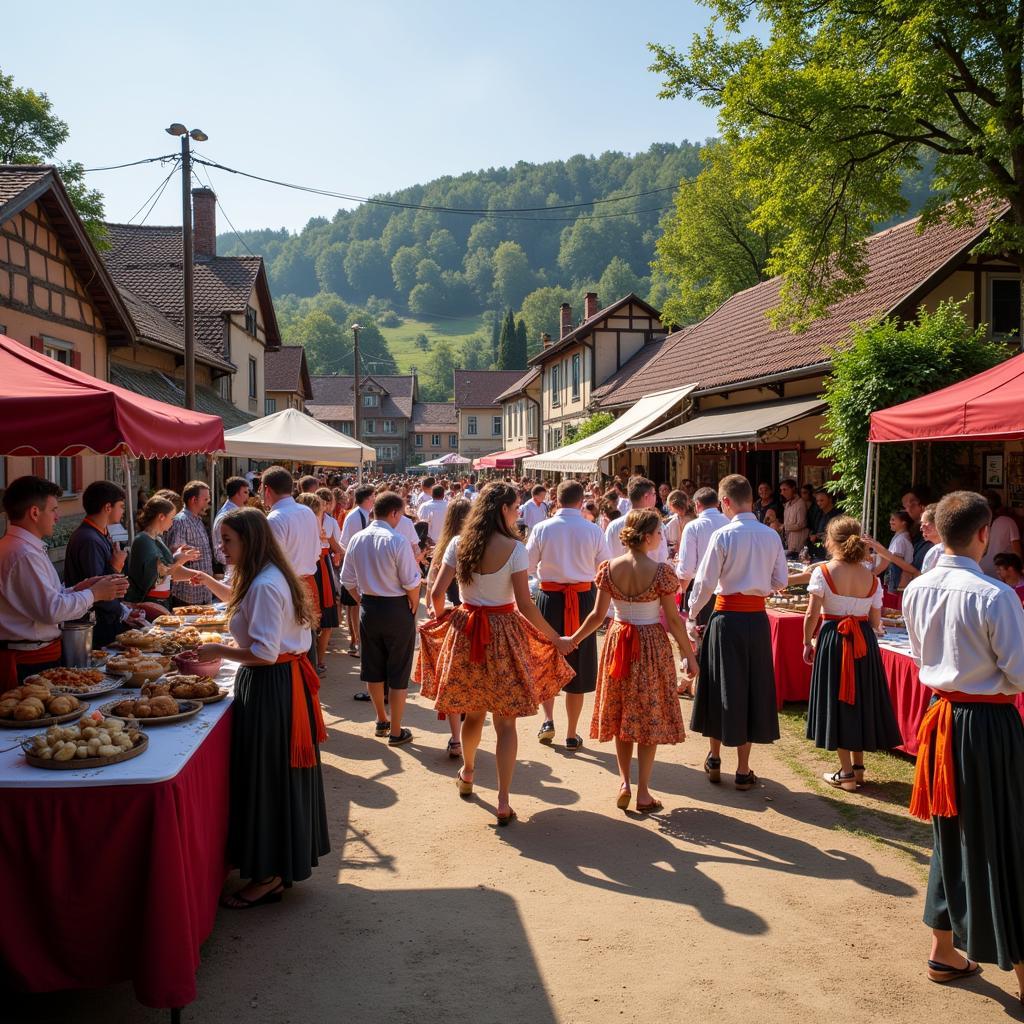The Society Of The Danube Swabians represents a unique and often overlooked chapter in European history. This article delves into the rich tapestry of their culture, traditions, and the challenges they faced, offering a comprehensive understanding of the Danube Swabian society. We explore their origins, their contributions to the regions they inhabited, and their enduring legacy.
 Danube Swabian families in traditional clothing
Danube Swabian families in traditional clothing
The Danube Swabians were a diverse group of German-speaking people who settled along the Danube River basin in several Central and Eastern European countries, including Hungary, Romania, Serbia, and Croatia. Their migration began in the 17th century, encouraged by the Habsburg monarchy seeking to repopulate and revitalize lands devastated by Ottoman rule. They brought with them their skills in agriculture, crafts, and trade, significantly impacting the economic and social development of the region. Their distinct dialects, customs, and traditions flourished for centuries, creating a vibrant cultural mosaic along the Danube. However, the 20th century brought immense hardship for the Danube Swabians. Following World War II, they faced persecution, expulsion, and forced assimilation due to their perceived association with Nazi Germany, a tragic chapter that decimated their communities and scattered its members across the globe.
Exploring the Cultural Heritage of the Danube Swabians
The Danube Swabian culture is a testament to their resilience and adaptability. Despite facing numerous challenges, they managed to preserve their unique traditions, including their distinctive dialects, music, cuisine, and religious practices. Their vibrant folk music, often accompanied by traditional instruments, tells stories of their history, joys, and sorrows. Their cuisine, a blend of German, Hungarian, and Balkan influences, reflects the cultural exchange and fusion that characterized their communities.
The Importance of Community in Danube Swabian Society
Community played a central role in Danube Swabian life. Villages and towns served as hubs of social interaction, where traditions were passed down through generations. Religious festivals, weddings, and other community gatherings provided opportunities for people to connect, celebrate, and reinforce their shared identity. These strong communal bonds helped them navigate challenging times and preserve their cultural heritage.
 A Danube Swabian village celebrates a traditional festival.
A Danube Swabian village celebrates a traditional festival.
The Danube Swabians After World War II
The aftermath of World War II brought unprecedented challenges for the Danube Swabians. Accused of collaboration with the Nazi regime, they faced widespread discrimination, persecution, and forced expulsion from their ancestral homelands. Hundreds of thousands were forced to flee, seeking refuge in other countries, including Germany, Austria, the United States, Canada, and Australia.
The Impact of Displacement on the Danube Swabian Identity
The displacement and scattering of the Danube Swabians had a profound impact on their identity. While many worked to preserve their traditions and language in their new homes, the loss of their ancestral lands and the disruption of their communities presented significant challenges. Today, Danube Swabian organizations around the world strive to maintain their cultural heritage, connect descendants, and document their history.
Preserving the Legacy of the Danube Swabians: A Call for Understanding and Peace
Understanding the history and experiences of the Danube Swabians is crucial for fostering peace and reconciliation. Their story serves as a reminder of the devastating consequences of prejudice, discrimination, and forced migration. By acknowledging their suffering and celebrating their resilience, we can work towards building a more inclusive and peaceful future.
The Danube Swabians’ story is one of resilience, adaptation, and the enduring power of culture. While their communities were scattered, their legacy continues to live on through the efforts of Danube Swabian organizations and descendants around the world. By remembering their past, we can learn valuable lessons about the importance of tolerance, understanding, and the pursuit of peace.
Expert Insight:
- Dr. Katharina Schmidt, Historian specializing in Danube Swabian history: “The Danube Swabians’ experience underscores the importance of understanding the complexities of history and the need to avoid generalizations and stereotypes.”
- Franz Becker, President of the Danube Swabian Association of North America: “Preserving the Danube Swabian heritage is essential for honoring the memory of those who suffered and for ensuring that their story is not forgotten.”
FAQ:
- Who were the Danube Swabians?
- Where did the Danube Swabians live?
- What language did the Danube Swabians speak?
- What happened to the Danube Swabians after World War II?
- How can I learn more about Danube Swabian history and culture?
- What are some Danube Swabian traditions?
- Are there any Danube Swabian organizations today?
Related Articles You Might Find Interesting:
- The History of the Danube Region
- Ethnic Minorities in Central and Eastern Europe
- The Impact of World War II on European Communities
Need Help? Contact us at Phone Number: 02043854663, Email: [email protected] Or visit our address: Zone 34, Bac Giang, 260000, Vietnam. We have a 24/7 customer support team.